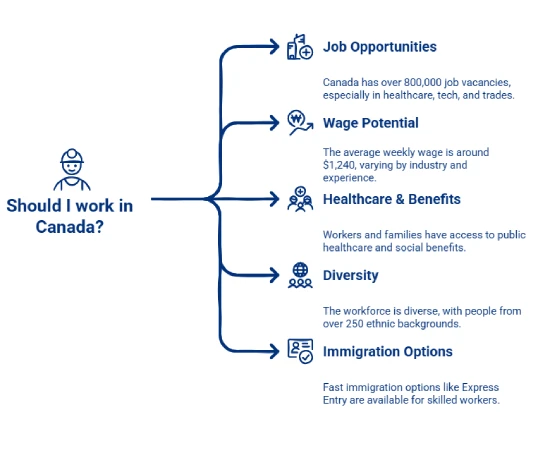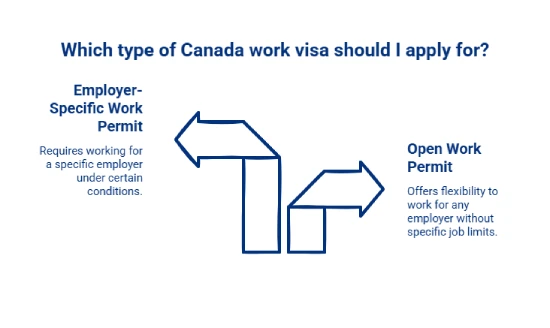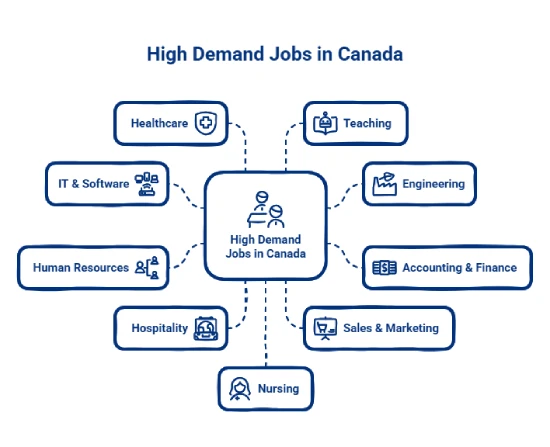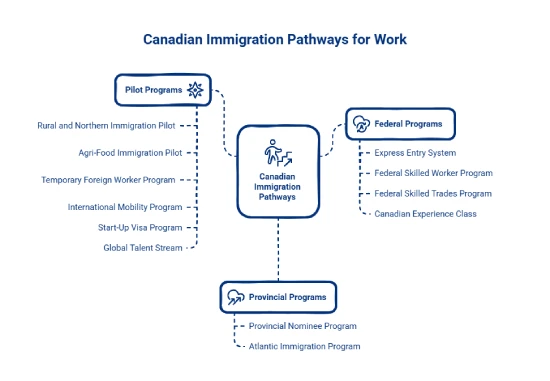Canada's job market is looking good, with more than 700,000 job openings across the country as of early 2025. Sectors like healthcare, tech, skilled trades, and education are really short on workers, which makes them top priorities for immigration and hiring. For instance, healthcare has over 120,000 job vacancies and tech roles are increasing by 25% each year.
The table below has the list of In-demand occupations in Canada:
| Occupations | Job Opportunities in Canada | Average Salaries per year |
| Engineering | 1,50,000 | $125,541 |
| IT | 1,32,000 | $101,688 |
| Marketing & Sales | 85,200 | $92,829 |
| HR | 64,300 | $65,386 |
| Healthcare | 2,48,000 | $126,495 |
| Teachers | 73,200 | $48,750 |
| Accountants | 1,63,000 | $65,386 |
| Hospitality | 93,600 | $58,221 |
| Nursing | 67,495 | $71,894 |
Canada has a lively job market, good living standards, and solid support systems, making it a great place for professionals from around the world. With over 800,000 job openings right now, there are plenty of chances for career growth and moving to the country.

A Canada Work Permit lets foreign workers legally work in Canada for a specific employer, job, and time period. You usually need a valid job offer from a Canadian company to get one, and in many cases, you might also need a Labour Market Impact Assessment (LMIA). There are two main kinds of work permits: Employer Specific Work Permits and Open Work Permits, which depend on your circumstances. Having a work permit can also help you move toward permanent residency through programs like Express Entry or Provincial Nominee Programs.
*Want to apply for a Canada work visa? Get in touch with experts at Y-Axis to assist you with the procedure.
Canada has different types of work permits to bring in skilled workers for its growing economy. There are two main kinds: Open Work Permits, which let you work for any employer, and Employer Specific Work Permits, which tie you to one company and job.

The table below gives you a complete overview of the Canada work visa types:
| Work Permit Type | Description | Types of work visas |
| Open Work Permit | You can work for any employer in Canada without specific job limits. | |
| Spousal Open Work Permit | ||
| Employer Specific Work Permit | You can only work for the employer listed on the permit under certain conditions. | Temporary Foreign Worker Program (TFWP) |
| LMIA based Work Permit | ||
| Intra Company Transfer | ||
| Global Talent Stream |
Canada has a lot of well-paid job opportunities in different fields. Whether you're already in your career or just graduating, there are good jobs out there to help you thrive.
Given below is an overview of the highest-paying jobs in Canada, along with salary info and growth trends.
Canada’s booming tech sector offers a wide array of roles for software developers, engineers, and IT professionals.
Average Salary: CAD 83,031/year
Salary Range: CAD 64,158 to CAD 130,064/year
Engineering managers and technical experts are in demand, especially in infrastructure, renewable energy, and manufacturing.
Average Salary: CAD 77,423/year
Salary Range: CAD 54,443 to CAD 138,778/year
Accounting and finance professionals are highly valued across industries, with strong earning potential.
Average Salary: CAD 105,000/year
Salary Range: CAD 65,756 to CAD 193,149/year
With every growing company comes a need for HR professionals to support the workforce and compliance.
Average Salary: CAD 95,382/year
Salary Range: CAD 78,495 to CAD 171,337/year
Canada’s tourism and hospitality industries are recovering strongly, creating new employment opportunities.
Average Salary: CAD 55,000/year
Salary Range: CAD 37,811 to CAD 96,041/year
Dynamic and performance-driven, sales and marketing roles offer career growth and financial rewards.
Average Salary: CAD 77,350/year
Salary Range: CAD 48,853 to CAD 165,500/year
Canada’s healthcare sector is actively hiring doctors, nurses, technicians, and allied professionals.
Average Salary: CAD 91,349/year
Salary Range: CAD 48,022 to CAD 151,657/year
Teachers are in demand across Canada’s provinces and territories, especially in remote and rural areas.
Average Salary: CAD 63,989/year
Salary Range: CAD 45,000 to CAD 107,094/year
With over 17,000 openings, nursing continues to be one of the most in-demand healthcare occupations.
Average Salary: CAD 58,500/year
Salary Range: CAD 42,667 to CAD 105,109/year

Canada's job market is pretty varied, with each province having its own specific needs, especially in sectors that are growing fast.
Here's a look at the most in demand jobs by province:
| Province/Territory | Top In Demand Job Categories |
| Ontario | Software Developers & Programmers; Registered Nurses; Administrative Assistants; Sales Associates |
| British Columbia | Healthcare (Nurses, Personal Support); Tech Support & IT; Hospitality Supervisors |
| Alberta | Skilled Trades (Electricians, Mechanics); Administrative Assistants; Business & Finance Roles |
| Manitoba | Customer Service; Administrative Assistants; Social Services Coordinators |
| New Brunswick | Healthcare Aides; School Education Assistants; Construction Trades |
| Nova Scotia | Hospitality Staff (Cooks, Servers); Healthcare Positions; Sales Representatives |
| Québec | Retail Sales; Food Service Supervisors; IT Specialists |
| Saskatchewan | Skilled Trades; Healthcare Support; IT occupations |
| Newfoundland & Labrador | Healthcare Professionals; Administrative Assistants; Tech roles |
| Northwest Territories | Health Care Aides; Administrative Roles; Skilled Trades |
| Yukon | Hospitality & Tourism; Tech Support; Healthcare Clinics |
| Nunavut | Skilled Trades; Healthcare Aides; Community Support Workers |
Individuals looking to work in Canada must fulfill certain eligibility requirements.
Given below is the list of general criteria to be fulfilled while applying for a work visa in Canada:
If you are applying from inside Canada, here’s what you need to know:
If you are applying from outside Canada, here’s what you should consider:
For those wanting to apply after arriving in Canada:
You must meet the below requirements to work in Canada:
Canada has different immigration programs at both the federal and provincial levels aimed at bringing in skilled workers, entrepreneurs, and professionals who want to work and are looking for long-term settlement.
Given below is the list of top Canadian immigration pathways:

*Want to migrate to Canada? Get in touch with experts at Y-Axis to assist you with the process.
You can follow the below steps to apply for jobs in Canada from abroad:
Step 1: Research the job market in Canada.
Step 2: Create a resume and cover letter that match Canadian standards.
Step 3: Apply for jobs on reliable Canadian job websites.
Step 4: Get your credentials checked if needed.
Step 5: Take a language test like IELTS, CELPIP, or TEF.
Step 6: Make sure you have a valid job offer.
Step 7: Apply for a work permit or PR visa for Canada.
Step 8: Collect and organize all necessary documents.
Step 9: Submit your application on the IRCC website.
Y-Axis is the world's No.1 overseas Immigration consultant, providing unbiased and innovative immigration assistance for 25+ years.
Our team of experts will assist you with:
Explore what Global Citizens have to say about Y-Axis in shaping their future
Canada PR Visa
Sameer got Permanent Resident Visa for C
Read More...
Canada Work Permit Visa
Varun provided us with great Y-Axis Revi
Read More...
Canada PR Visa
One of our client Virendra availing his
Read More...
Canada is seeing a shortage of workers in several important industries. In 2025, high-demand jobs include roles in healthcare like registered nurses and doctors, tech positions like software developers and data analysts, skilled trades like electricians and welders, finance jobs like accountants and auditors, and construction roles such as project managers and surveyors. These jobs are especially sought after in places like Ontario, British Columbia, and Alberta and often appear on lists from federal and provincial governments.
To get a work permit in Canada, foreign workers need to meet certain conditions. Generally, you’ll need:
Jobs are labeled as in demand when there’s a shortage in the labor market. As of 2025, some of the top in-demand careers include:
Note: These occupations often show up in Canada’s Express Entry or Provincial Nominee Programs (PNPs) and might get prioritized in processing.
To look for jobs in Canada while still in your home country, you can follow the below steps:
Step 1: Start by updating your resume to fit Canadian standards.
Step 2: Use reputable job sites like Job Bank, Indeed Canada, and LinkedIn.
Step 3: Focus on employers who can hire foreign workers.
Step 4: After getting a job offer, apply for a work permit through Immigration, Refugees and Citizenship Canada (IRCC).
Step 5: Be ready for interviews, provide necessary papers (like education and references), and go for a biometrics appointment if needed.
There are two main types of Canadian work permits:
The eligibility varies by program, but general requirements include:
You can apply for a Canada work permit by following the below steps:
Step 1: Get a job offer from a Canadian employer.
Step 2: Check if an LMIA is needed and have your employer handle that if it is.
Step 3: Collect all necessary documents like your educational certificates, resume, language test results, and proof of work experience.
Step 4: Submit your work permit application online through the IRCC portal.
Step 5: Attend any required biometrics or medical exams.
Step 6: Keep track of your application and respond to any requests from IRCC.
The average salary in Canada is around CAD 59,000 a year, but this can vary by profession:
| Occupation | Average annual salaries |
| IT professionals | CAD 83,000–130,000 |
| Healthcare workers | CAD 75,000–150,000 |
| Skilled trades | CAD 50,000–90,000 |
| Finance sector | CAD 85,000–190,000 |
Note: Salaries can also differ based on location and experience, with bigger cities like Toronto and Vancouver often paying more.
Canada is also looking for workers in unskilled jobs, especially through pilot programs. Some in-demand unskilled jobs are:
Note: These jobs are often part of regional and rural immigration programs, like the Agri-Food Pilot or Rural and Northern Immigration Pilot. While an LMIA might still be required, some exemptions apply based on the program.
The cost of living in Canada can change a lot depending on where you live, your lifestyle, the size of your family, and your immigration status. On average, a single person might spend about CAD 1,200 to CAD 2,500 a month without rent. For a family of four, monthly costs can range from CAD 4,000 to CAD 6,000, depending on the province.
The table below has details of the average cost of living in Canada:
| Expense Category | Monthly Average (Single) | Monthly Average (Family of 4) |
| Rent (1-bedroom apt) | 1,200 – 2,000 | 2,000 – 3,500 |
| Food & Groceries | 300 – 600 | 800 – 1,200 |
| Utilities & Internet | 150 – 300 | 200 – 400 |
| Transportation | 100 – 250 | 200 – 400 |
| Miscellaneous | 100 – 200 | 200 – 500 |
Note: The living expenses are usually higher in cities like Toronto and Vancouver, while places like Manitoba and New Brunswick are more affordable.